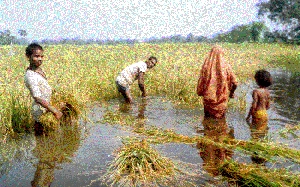Flood-tolerant rice offers relief for world’s poorest farmers
A gene that enables rice to survive complete
submergence has been identified by a team of researchers at the International
Rice Research Institute in the Philippines and at the University of
California’s Davis and Riverside campuses. The discovery allows for
development of new rice varieties that can withstand flooding, thus overcoming
one of agriculture’s oldest challenges and offering relief to millions of
poor rice farmers around the world.

A gene that enables rice to survive complete submergence has been identified by a team of researchers at the International Rice Research Institute in the Philippines and at the University of California’s Davis and Riverside campuses. The discovery allows for development of new rice varieties that can withstand flooding, thus overcoming one of agriculture’s oldest challenges and offering relief to millions of poor rice farmers around the world.
While rice thrives in standing water, like all crops it will die if completely submerged for more than a few days. The development and cultivation of the new varieties is expected to increase food security for 70 million of the world’s poorest people, and may reduce yield losses from weeds in areas like the United States where rice is seeded in flooded fields.
Does anyone still need to be convinced that projects like this make us more friends than enemies around the world?
Using genetic mapping techniques, the research team identified a cluster of three genes that appeared closely linked to the biological processes that either make rice plants vulnerable to flooding or enable them to withstand the total submergence that occurs during flooding.
Going one step further, the researchers introduced the Sub1A gene into a rice variety that is especially suited for growing conditions in India. The resulting rice plants were not only tolerant of being submerged in water but also produced high yields and retained other beneficial crop qualities. Development of submergence-tolerant varieties for commercial production in Laos, Bangladesh and India is now well under way.
I don’t know who drives me crazier: political hacks whose heads are stuck in the Cold War and assign greater priority to military scenarios in developing nations — or 21st Century Luddites who are convinced that genetic manipulation is a tool of Satan!
Posted: Fri - August 11, 2006 at 07:09 AM